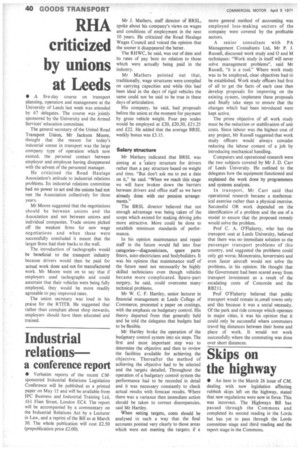Industrial
Page 42

If you've noticed an error in this article please click here to report it so we can fix it.
relations—
a conference report
• Verbatim reports of the recent CMsponsored Industrial Relations Legislation Conference will be published as a printed paper on May 15 and will be available from IPC Business and Industrial Training Ltd, 161 Fleet Street, London EC4. The report will be accompanied by a commentary on the Industrial Relations Act by a Lecturer in Law, and a reprint of the Bill as at March 30. The whole publication will cost £2.50 (prepublication price £2.00).
Mr J. Mathers, staff director Of BRSL, spoke about his company's views on wages and conditions of employment in the next 10 years. He criticized the Road Haulage Wages Council and voiced the opinion that the sooner it disappeared the better.
The RHWC, he said, was out of date and its rates of pay bore no relation to those which were actually being paid in the industry.
Mr Mathers pointed out that, traditionally, wage structures were compiled on carrying capacities and while this had been ideal in the days of rigid vehicles the same could not be said to be true in these days of articulation.
His company, he said, had • proposals before the union at the moment for payment by gross vehicle weight. Four pay scales would be employed at £20, £20.50, £21.25 and £22. He added that the average BRSL weekly bonus was £3.15.
Salary structure
Mr Mathers indicated that BRSL was aiming at a isalary structure for drivers rather than a pay structure based on weight and time. "But don't ask me to put a date On it," he said. "When we reach this stage we will have broken down the barriers between drivers and office staff as we have already done with our pension arrangements."
The BRSL director believed that not enough advantage was being taken of the scope which existed for making driving jobs more attractive. More could be done to establish minimum standards of performance.
In his opinion maintenance and repair staff in the future . would fall into four categories—diagnosticians, spare parts fitters, auto-electricians and bodybuilders. It was his opinion that maintenance staff of the future need not necessarily be highly skilled technicians even though vehicles became more complicated. Spare-part surgery, he said, could overcome many • technical problems.
Mr W. C. F. Hartley, senior lecturer in financial management at Leeds College of Commerce, presented a paper on costings, with the emphasis on budgetary control. His theory departed from that generally held and he told the delegates that budgets had to be flexible.
Mr Hartley broke the operation of the budgetary control system into six steps. The first and most important step was to determine the objective and then to review the facilities available for achieving the objective. Thereafter the method of achieving the objective had to be selected and the targets detailed. Throughout the operation of a budgetary control system the performance had to be recorded in detail and it was necessary constantly to check actual results with forecast results. Where there was a variance then immediate action should be taken to correct discrepancies. said Mr Hartley.
When setting targets, costs should be analysed in such a way that the final accounts pointed very clearly to those areas which were not meeting the targets; if a more general method of accounting was employed loss-making sectors of the company were covered by the profitable sectors.
A senior consultant with PA Management Consultants Ltd, Mr P. J. Russell, discussed work study and 0 and M techniques: "Work study in itself will never solve management problems", said Mr Russell, "it is a tool." Where work study was to be employed, clear objectives had tO be established. Work study officers had first of all to get the facts of each case then develop proposals for improving on the existing system, implement these proposals and finally take steps to ensure that the changes which had been introduced were kept active.
The prime objective of all work study must be the reduction or stabilization of unit costs. Since labour was the highest cost of any project, Mr Russell suggested that work study officers would always consider reducing the labour content of a job by introducing mechanical handling.
Computers and operational research were the two subjects covered by Mr J. D. Carr of Leeds University. He outlined to the delegates how the equipment functioned and explained the work done by programmers and systems analysts.
In transport, Mr Carr said that operational research became a mathematical exercise rather than a physical exercise. Successful OR work depended on the identification of a problem and the use of a model to ensure that the proposed remedy would solve the problem.
Prof C. A. O'Flaherty, who has the transport seat at Leeds University, believed that there was no• immediate solution to the passenger transport problems of this country, and suggested the problems could only get worse. Monotrains, hovertrains and even faster aircraft would not solve the problems, in his opinion. He thought that the Government had been scared away from transport investment as a result of the escalating costs of Concorde and the• RB211.
Prof O'Flaherty believed that public transport would remain in,small towns only and this because it was a social necessity. Of the park and ride concept which operates in major cities, it was his opinion that it could only be successful where commuters travel big distances between their home and place of work. It would not work successfully where the commuting was done over short distances.




































































































































